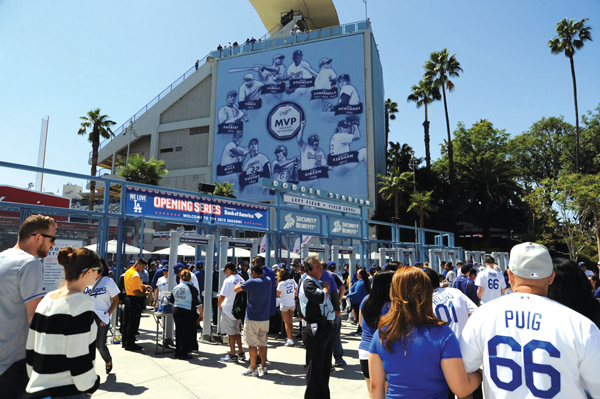For years, the Los Angeles Dodgers’ considerable heritage lay aging inside rusting filing cabinets in forgotten rooms at Dodger Stadium, or gathering dust in cardboard boxes at off-site storage warehouses. Bits and pieces of Dodger tradition were ingloriously stored in the stadium parking lot.
It was time for a spring cleaning.
“We had what I called ‘stuff,’ but a lot of other people called it ‘junk,’” said Lon Rosen, Dodgers executive vice president and chief marketing officer. Stacks of boxes and files are one thing, but a readily accessible digital archive is another, especially when demand for content is soaring.
 |
A chance meeting between Keir Walton (left) and Charlie Turano (right) helped Heritage Werks branch into sports, such as working with the Dodgers.
Photos by: HERITAGE WERKS
|
Three years ago, the Dodgers called on archival specialists Heritage Werks. Soon, two moving vans stuffed with Dodgers artifacts and documents were rolling toward Heritage Werks’ Atlanta headquarters. Not long after, Rosen was seeing forgotten treasures: Sandy Koufax’s original scouting report, a wheelchair used by Roy Campanella, and Orel Hershiser’s 1993 Silver Slugger award, misplaced so long ago that a replacement had been manufactured.
More importantly, the Dodgers have the contents of all of those musty boxes and rusty file cabinets digitized and accessible. There’s now a system in place to archive today’s “junk.”
“In terms of harnessing the day-to-day creation of content, figuring out how to digitize, store it and make it all immediately accessible, that’s easier than ever,” said Bill DeWitt III, president of the St. Louis Cardinals, a Heritage Werks client since 2013. “We’d done a good job of keeping our archival stuff, but if you can’t access it right when you need it, you might as well not even have it.”
Keir Walton started Heritage Werks in 2009 after years in the marketing business gave him a notion. As the world went digital, big brands increasingly needed digital access to their archives for marketing and content creation. The business was founded to inventory, organize, preserve, digitize and make accessible the archives of corporate brands like Hewlett-Packard and Nestlé.
A chance meeting at the CMO Club in New York City with Genesco Sports co-founder Charlie Turano opened Walton’s eyes to the opportunities in sports, since a team’s heritage is a principal and priceless asset.
By 2013, Heritage Werks was winning its first sports clients: tradition-laden franchises including the Cardinals, Dodgers and Atlanta Braves were entrusting their history to a relatively unknown company. Heritage Werks’ brand practice helped validate it; so did an early endorsement from longtime sports lawyer and Premier Partnerships Chairman Alan Rothenberg, who told Walton and Turano early on that “heritage is bigger than sports.”
Now Heritage Werks is building a business on history. Around 10,000 users are accessing their archives through its systems. The company has more than 50,000 linear feet of content in its Atlanta headquarters, along with millions of digital assets.
Heritage Werks
■ Launched: 2009
■ Headquarters: Atlanta
■ Number of employees: 50
■ What they Do: Digitizes, builds and manages archival storage and accessibility systems for teams and brands.
KEY EXECUTIVES:
■ Keir Walton, founder and CEO
■ Charlie Turano, executive director
SELECT SPORTS CLIENTS:
■ Atlanta Braves
■ Golden State Warriors
■ Los Angeles Dodgers
■ Los Angeles Kings
■ Pittsburgh Steelers
■ St. Louis Cardinals
SELECT NON-SPORTS CLIENTS:
■ Nestlé USA
■ Hewlett-Packard
■ PVH Corp. (Calvin Klein, Tommy Hilfiger, Izod, Arrow, Van Heusen, Speedo)
“Most people have difficulty organizing their own family photos,” Walton said. “We’ll see teams with upward of half a million photos on their servers untagged. Often, our first step is getting all of those photos under control and making them accessible.”
The cost to a company or team can vary greatly, depending on client needs.
Other than servicing programs like the “Steelers Nation” loyalty program or Vin Scully’s retirement, unfettered access to archives also serves as the basis for creating stadium or arena displays. It can even be a sales tool.
“If you’re renewing a 30-year-old sponsorship, this gives you the ability to talk about that history, instead of just the renewal terms,” Turano said.
Teams have varying needs, but all have a legacy to preserve. When the Los Angeles Kings began to gather historical material for their 50th anniversary, there was a problem. With a half-dozen ownership groups and a bankruptcy in its past, the Kings’ archives were somewhere between scattered and non-existent.
“Pre-Wayne Gretzky (1988) there was almost nothing,” said Kelly Cheeseman, COO of the Kings. Heritage Werks helped track down long-lost photos from former staff photographers, archives of defunct newspapers, even asking Kings alumni what they had in closets and scrapbooks.
 |
Heritage Werks helps clients organize and manage their history.
|
Some of the photos became staples of the team’s 50th anniversary campaign.
“Now we have an organized process to keep us from ever getting in that situation again,” Cheeseman said.
With singular ownership over the years, the Pittsburgh Steelers had different needs. Like the Dodgers, the Steelers’ archives were here and there — at their home field, practice facility and at local warehouses. For the Steelers’ rich legacy, Heritage Werks produced a playbook, delineating key historic dates, with links to supporting archival material.
“History’s a huge part of our brand, so it’s critical for our business to have easy access,” said Ryan Huzjak, Steelers vice president of sales and marketing. “We have to be the historical experts on our brand, and Heritage Werks helps us do that.”
Walton sees colleges as a huge opportunity and recently signed Bowling Green University.
“The biggest challenge has been that almost no team has a budget line for history,” he said. “But the good news for us is that everyone loves a winner and heritage never loses.”






